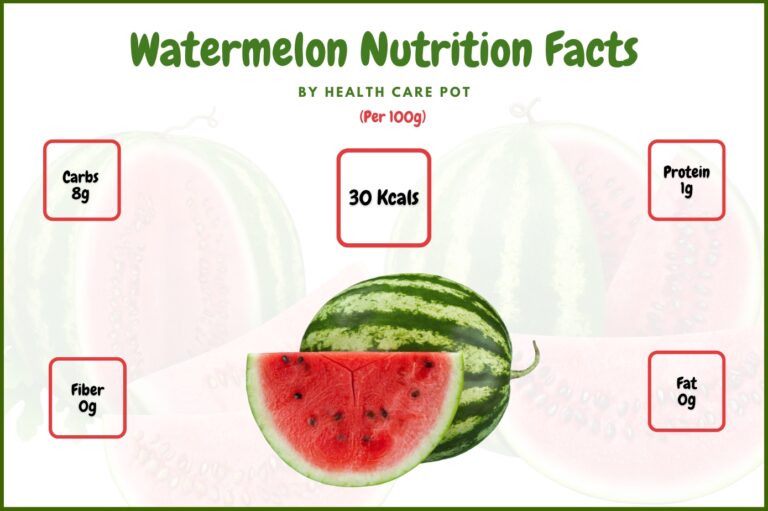Watermelon is a summer fruit that contains 91% of water. It is a super water-rich food.
The watermelon's scientific name is 'Citrullus lanatus'. Watermelon is used commercially to make jam, pickles, jelly, and candies.
Watermelon Nutrition Facts
Here below table shows watermelon nutrition facts for 100g.
Serving size 100 g
Servings per container 1 Calories from Fat 0 * Percent Daily Values are based on a 2,000 calorie diet. Your daily values may be higher or lower depending on your calorie needs.Nutrition Facts
Amount per serving
Calories 30
% Daily Value*
Total Fat 0g
0%
Saturated Fat 0g
0%
Trans Fat 0g
Cholesterol 0mg
0%
Sodium 1mg
1%
Total Carbohydrate 8g
3%
Dietary Fiber 0g
0%
Sugars 6g
Protein 1g
100 gram of watermelon contains 30 Kcals, 0 grams of fat, 8 grams of carbohydrates, and 1 gram of protein.
There is no cholesterol or trans fat in the watermelon. It contains 1 mg of sodium.
Calories:
100 grams of watermelon has 30 Kcals(127 kJ). Most of the calories come from carbohydrates.
A 100-gram of watermelon retains 8 grams of carbohydrates and 6 grams of natural sugar. In 100 grams of watermelon, Net carbs(Total Carbs-Fiber) should be 8 grams.
8 grams of sugar include:
Sucrose 1.21g
Glucose 1.58g
Fructose 3.36g
Maltose 0.06g
Watermelon doesn't contain fats.
100 grams of watermelon deliver 1 gram of protein.
Glycemic Index:
The glycemic index of watermelon is 72. Despite its high glycemic index, consuming a small portion of it doesn't spike your blood sugar.
Watermelon's Vitamins And Minerals
Vitamines | Content | Minerals | Content |
|---|---|---|---|
Vitamin C | 8.1 mg | Calcium | 7 mg |
Vitamin A | 28 mcg | Phosphorus | 11 mg |
Vitamin E | 0.05 mg | Potassium | 112 mg |
Vitamin K | 0.1 mcg | Iron | 0.24 mg |
Vitamin B1 | 0.033 mg | Magnesium | 10 mg |
Vitamin B2 | 0.021 mg | Zinc | 0.1 mg |
Vitamin B3 | 0.178 mg | Copper | 0.042 mg |
Vitamin B6 | 0.045 mg | Manganese | 0.038 mg |
Vitamin B9 | 3 mcg |
100 grams of watermelon has Vitamin C(9%), Vitamin A(3%), Vitamin E(0.3%) and Vitamin K(0%) of your RDA(Recommended Dietary Allowances).
Vitamin C boosts immunity and lower blood pressure. Vitamin A helps to boost the healing process, maintain healthy teeth, and promote good eyesight.
100 grams of watermelon can give Vitamin B1(thiamin) 3%, Vitamin B2(riboflavin) 1%, Vitamin B3(niacin) 1%, Vitamin B6(pyridoxine) 3%, and Vitamin B9(folate) 0.8% of your RDA(Recommended Dietary Allowances). B vitamins may boost skin and hair health, enhance mood, and support the immune system.
Minerals are also required for the body's growth. Let's check its percentage value.
100 grams of watermelon provides Calcium 0.6%, Phosphorus 0.3%, Potassium 6%, Iron 21%, Magnesium 2%, Zinc 1%, Copper 5%, and Manganese 2% of your RDA (Recommended Dietary Allowances).
Calcium construct and sustain strong bones; Phosphorus helps to remove waste and repair damaged tissues.; Potassium controls fluid balance; Iron needed for the body's growth and development; Magnesium sustains muscle, nerve function, and energy production.
Zinc plays a significant role in cell growth and the creation of DNA; Copper makes red blood cells; Manganese supports the body in developing connective tissue, bones, and blood clotting factors.
Watermelon's Benefits
Watermelon for weight loss:
It is made up of 91% of water and super low-calorie fruit. 100 gram of watermelon contains just 30 Kcals(127 kJ). Low-calorie food helps a lot in the weight loss process. It fills your stomach for a longer period and costs very low calories. That ends up as a fat loss.
Watermelon benefits for skin:
Watermelon is rich in antioxidants and vitamin C that help clear skin acne, help to form and maintain collagen growth, and slow aging. Vitamin C works magic for the skin.
Watermelon benefits for men:
Some research found that watermelon can reduce the risk of kidney stones, osteoporosis, and high blood pressure. Watermelon holds a red pigment called Lycopene, which is improved sperm quality.
Watermelon benefits for women:
One USA research(link) found that 41.9% of women faced obesity. Low-calorie food may help a lot with obesity and overweight. Also, high watermelon water contains help to hydrate the skin.
Comment down your suggestions and queries in the comment section. We will love to hear from you.
Frequently Asked Questions(FAQ):
Watermelon contains an adequate amount of vitamins, minerals, and antioxidants make it a superfood.
Watermelon is a summer fruit containing high water content, vitamins, and minerals. In summer, watermelon helps to hydrate the body and costs very low calories, so it is healthy to eat it every day.
Watermelon carries a red pigment called Lycopene, which is improved sperm quality.
Arginine is the amino acid that increases testosterone. Watermelon contains citrulline that the body converts into arginine.

